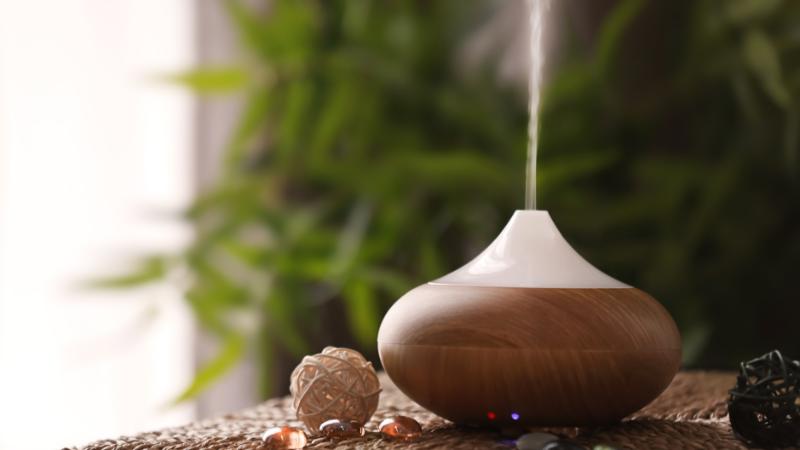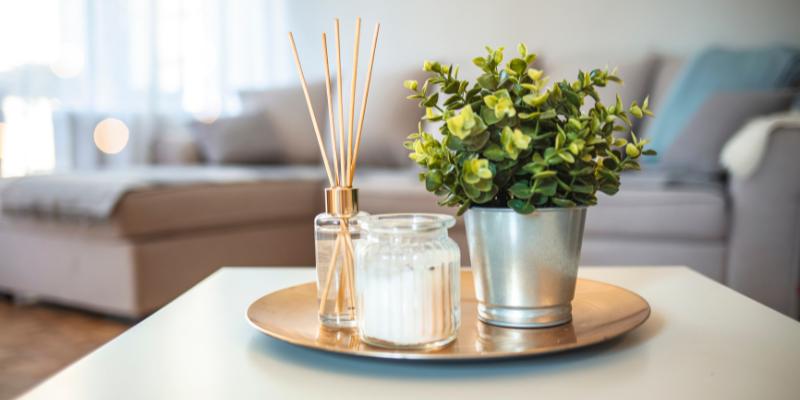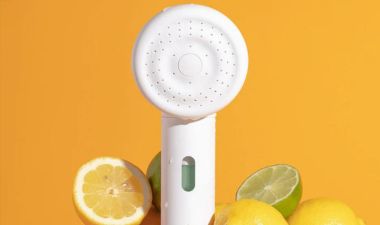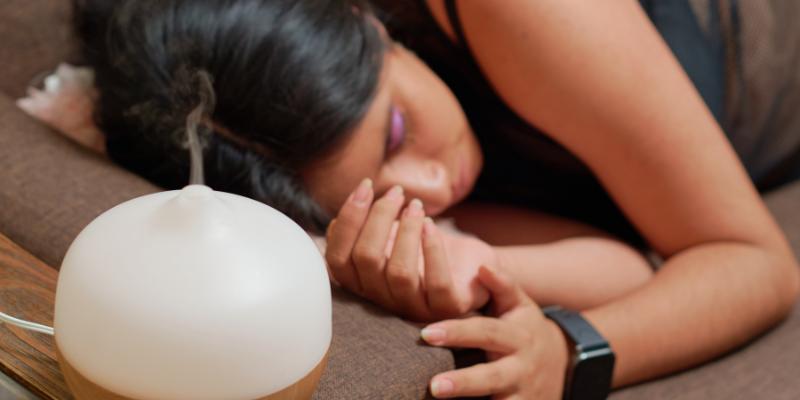Aromatherapy Diffuser: The Key to a Relaxing and Soothing Environment

As we go about our daily lives, we encounter various scents that can either uplift or dampen our moods.
Aromatherapy diffusers have become increasingly popular as a way to harness the power of essential oils and create a soothing and relaxing atmosphere in our homes or workplaces.
These diffusers come in different shapes and sizes, each with its unique features and benefits. In this blog post, we will explore the world of aromatherapy diffusers and discover how they can enhance our well-being and transform our living spaces.
What are Aromatherapy Diffusers?

Aromatherapy diffusers are devices that are used to disperse essential oils into the air, creating a pleasant and relaxing atmosphere in any room.
These diffusers work by breaking down the essential oils into tiny particles and dispersing them into the air, where they can be inhaled and absorbed by the body.
There are several different types of essential oil diffusers available on the market today, each with its unique features and benefits. The most popular types of diffusers include ultrasonic, nebulizing, heat, and evaporative diffusers.
You may also be interested in: Aromatherapy Benefits in the Shower
Ultrasonic Diffusers
Ultrasonic models use high-frequency vibrations to break down the essential oils into tiny particles that are then dispersed into the air as a cool mist. These diffusers are popular because they are quiet, easy to use, and can also act as humidifiers.
Pros: They are quiet, easy to use, and can also act as humidifiers. These diffusers are ideal for adding moisture to the air and enjoying the benefits of essential oils simultaneously.
Cons: A mist diffuser like this, requires regular cleaning to prevent mold growth. It also requires water, which means it may not be suitable for people with hard water or those who prefer not to use it.
Nebulizing Diffusers
Another popular type of diffuser is the nebulizing diffuser, which uses pressurized air to atomize essential oils into fine particles without the use of water.
Like ultrasonic diffusers, nebulizing diffusers do not alter the chemical composition of essential oils, making them an excellent choice for therapeutic purposes.
Nebulizing diffusers work by using a pump to force air through a small tube that contains the essential oil. As the air passes through the tube, it creates a vacuum that pulls the oil up and disperses it into the air as a fine mist.
Pros: Nebulizing diffusers do not require hot water or heat and can quickly fill a room with fragrance. They are perfect for those who want a strong aroma without any dilution. They also do not alter the chemical composition of essential oils, making them an excellent choice for therapeutic purposes.
Cons: Noise is the main issue with these diffusers due to the pump that forces air through the small tube containing essential oil. They also tend to be more expensive than other types of diffusers.
Heat Diffusers
Heat diffusers use heat to evaporate essential oils into the air. Candles are the perfect example of this type of diffuser, as the heat from the flame evaporates the essential oils.
Pros: Heat diffusers are inexpensive and easy to use. Heat diffusers are perfect for those who want an affordable option that does not require electricity.
Cons: Heat diffusers can alter the chemical composition of essential oils due to the heat used in the diffusion process. They also pose a fire hazard if left unattended.
Evaporative Diffusers
They work by using a fan or other mechanism to blow air over a pad or filter that has been soaked in essential oils.
As the air passes over the pad, it picks up the fragrance of the oil and disperses it into the room.
Pros: Evaporative diffusers are portable and easy to use. They are perfect for those who want an affordable option that is easy to carry around.
Cons: Evaporative diffusers may not be as effective as other types of diffusers since they rely on air movement to disperse essential oils. The fragrance may also dissipate quickly, requiring frequent reapplication.
Whether you prefer ultrasonic, nebulizing, heat, or evaporative diffusion, these devices can help you create a soothing and relaxing atmosphere in your home or workplace while enhancing your well-being.

H201SH!FT Shower Starter Kit
Shower with lovely scents to your skin’s delight, hydrated & glowing.
Benefits of Aromatherapy Diffusers

A fragrance diffuser has become an increasingly popular object in recent years, and for good reason.
These devices use essential oils to create a relaxing atmosphere in the home or office, and can also serve as a decorative item. But what exactly are the benefits of using aromatherapy diffusers?
Firstly, it’s important to understand how essential oils work in aromatherapy.
Essential oils are highly concentrated plant extracts that have been used for centuries for their therapeutic properties. When these oils are diffused into the air, they can be inhaled and absorbed by the body, offering a range of health and psychological benefits.
Stress Relief
One of the most significant health benefits of aromatherapy diffusers is stress relief. Essential oils such as lavender, chamomile, and ylang-ylang have been shown to have calming effects on the body and mind, helping to reduce feelings of anxiety and promote relaxation.
Improved sleep
Another benefit is improved sleep. Essential oils such as lavender and bergamot can help to promote a sense of calm and relaxation, making it easier to fall asleep and stay asleep throughout the night.
Respiratory support
Aromatherapy diffusers can also provide respiratory support. Oils such as eucalyptus and peppermint have been shown to have decongestant properties, helping to clear the sinuses and improve breathing.
Psychological benefits
In addition to these health benefits, aromatherapy diffusers can also provide psychological benefits. The use of essential oils has been shown to enhance mood, reduce feelings of depression, and promote a sense of well-being.
Whether you’re looking to improve your health or simply create a more relaxing atmosphere in your home or workplace, these devices can help you achieve your goals. So why not give them a try?
You may also be interested in: What can I use instead of essential oils in a diffuser?
Choosing the Right Aromatherapy Diffuser
When it comes to choosing the right aromatherapy diffuser, there are several factors to consider.
Type of diffuser
As we already said, there are several different types of diffusers, including ultrasonic, nebulizing, heat, and evaporative.
Each has its own unique features and benefits. Consider which type of diffuser will work best for your needs.
Tank size
The size of the tank in your diffuser determines how long it will run before needing a refill. If you want your diffuser to work all night or during a long workday, you’ll want a larger tank.
Be sure to consider your needs when choosing a diffuser with the appropriate tank size.
Timer settings
Some diffusers have timer settings that control how often the oils are dispensed.
Choosing a diffuser with adjustable timer settings can be helpful if you plan on using it throughout the day or night.
Automatic shut-off feature
Diffusers can pose a fire risk if they run dry or overheat.
Look for one with an automatic shut-off feature that will turn the diffuser off if the water level becomes too low or if it overheats.
Design and aesthetics
Aromatherapy diffusers come in a variety of styles and designs to match your home’s décor. Consider the aesthetics of the diffuser, including its size, shape, and color.
- Size: One of the most important factors is the size of the diffuser. If you have a large room or open floor plan, you may need a larger diffuser to effectively disperse the essential oils throughout the space. On the other hand, if you have a smaller room or workspace, a smaller diffuser may be sufficient.
- Noise level: Another factor to consider is the noise level of the diffuser. Some diffusers can be quite loud, which may be distracting or disruptive if you’re trying to work or relax. Look for a diffuser that operates quietly so that you can enjoy the benefits of aromatherapy without any unnecessary noise.
- Ease of use: Some diffusers require more maintenance and cleaning than others, so choose one that fits your lifestyle and schedule. If you’re short on time, look for a diffuser that is easy to clean and maintain.
It’s also important to match the diffuser to your needs and preferences. For example, if you’re looking for a diffuser that can help with respiratory issues, choose one that uses oils with decongestant properties.
If you’re looking for a diffuser that can help with stress relief, choose one that uses calming oils like lavender or chamomile.

H201SH!FT Shower Starter Kit
Shower with lovely scents to your skin’s delight, hydrated & glowing.
Using Essential Oils with Aromatherapy Diffusers

Essential oils are the backbone of aromatherapy diffusers. These highly concentrated plant extracts provide a range of health and psychological benefits when diffused into the air.
But with so many different types of essential oils available, it can be overwhelming to know where to start. We will explore the different types of essential oils and their benefits, how to safely use them with diffusers, and popular essential oil blends for various purposes.
Types of Essential Oils and Their Benefits
There are hundreds of different types of essential oils, each with its own unique properties and benefits. Here are some of the most popular essential oils and their benefits:
- Lavender: Known for its calming and relaxing properties, lavender is a popular choice for stress relief and improved sleep.
- Peppermint: With its invigorating scent, peppermint is often used for respiratory support and to promote mental clarity.
- Eucalyptus: This oil has decongestant properties that make it a great choice for clearing sinuses and improving breathing.
- Lemon: With its fresh, citrusy scent, lemon is often used to improve mood and promote a sense of well-being.
- Tea Tree: Known for its antiseptic properties, tea tree oil is often used for skin care purposes such as treating acne or insect bites.
How to Safely Use Essential Oils with Diffusers
When using essential oils with diffusers, it’s important to follow some basic safety guidelines. Here are some tips to keep in mind:
- Always dilute essential oils before use. Most diffusers require only a few drops of oil, but be sure to check the instructions for your specific device.
- Never apply undiluted essential oils directly to your skin or ingest them orally.
- Keep essential oils out of reach of children and pets.
- Only use high-quality essential oils from reputable sources.
Popular Essential Oil Blends for Different Purposes
One of the great things about aromatherapy diffusers is that you can create your custom blends based on your needs and preferences. Here are some popular blends for different purposes:
- Relaxation blend: Combine lavender, chamomile, and bergamot for a soothing effect.
- Energy blend: Combine peppermint, lemon, and rosemary for an invigorating boost.
- Respiratory blend: Combine eucalyptus, peppermint, and tea tree for improved breathing and
Maintenance and Care for Aromatherapy Diffusers
Maintaining and caring for your aromatherapy diffuser is essential to ensure that it functions properly and lasts a long time. Here are some tips on how to clean and upkeep different types of diffusers:
Ultrasonic diffusers maintenance
To clean an ultrasonic diffuser, first, unplug the device and empty any remaining water and oil. Then, use a soft cloth to wipe the interior of the water tank.
For stubborn buildup or residue, add a small amount of white vinegar to the tank and let it sit for 5-10 minutes before wiping it clean. Rinse the tank with clean water and allow it to air dry before using it again.
Evaporative diffusers maintenance
Cleaning an evaporative diffuser is relatively simple. First, remove the pad or filter from the device and discard it if it’s worn out or damaged.
Then, wipe down the exterior of the device with a soft cloth dampened with rubbing alcohol or white vinegar. Allow the device to dry completely before replacing the pad or filter.
Heat diffusers maintenance
Heat diffusers require more maintenance than other types of diffusers because they can cause essential oils to build up on the heating element over time.
To clean a heat diffuser, first, unplug the device and allow it to cool completely. Then, use a cotton swab dipped in rubbing alcohol to gently clean the heating element. Be sure not to get any alcohol on other parts of the device as this can damage them.
Now that you know how to clean your diffuser let’s take a look at some common issues that may arise and how to troubleshoot them:
Diffuser not producing mist
If your diffuser is not producing mist, first check if there is enough water in the tank. If there isn’t enough water, add more until it reaches the fill line.
If there is enough water but still no mist, try cleaning the device as described above. If neither of these solutions works, contact the manufacturer for further assistance.
Diffuser making noise
If your diffuser is making noise, try moving it to a different location where it can sit on a flat surface. Uneven surfaces can cause vibrations that may make noise.
If this doesn’t work, check if there is any debris or buildup in the water tank that may be causing noise when it vibrates. Clean the device as described above if necessary.
Diffuser not turning on
- If your diffuser is not turning on, first check if it’s plugged in properly and if there is power going to it.
- If it’s plugged in and there’s power going to it, try turning it on manually by pressing the button.
- If it still doesn’t work, try resetting the device by pressing and holding the button for 10 seconds.

H201SH!FT Shower Starter Kit
Shower with lovely scents to your skin’s delight, hydrated & glowing.
Conclusion
In conclusion, aromatherapy diffusers are an excellent way to harness the power of essential oils and create a soothing and relaxing atmosphere in your home or workplace.
With different types of diffusers available, it’s important to choose one that suits your needs and preferences.
Remember to always dilute essential oils before use, keep them out of reach of children and pets, and only use high-quality oils from reputable sources.
FAQ – Frequently Asked Questions
Can I use any type of essential oil in my diffuser?
It’s important to use high-quality essential oils from reputable sources. Some essential oils may not be suitable for certain types of diffusers, so always check the manufacturer’s instructions before use.
How long should I run my diffuser for?
This depends on the size of your diffuser and the amount of water it can hold. Most diffusers have a timer or automatic shut-off feature that will turn off the device after a certain amount of time. It’s generally recommended to run your diffuser for 30-60 minutes at a time.
Can I leave my diffuser on overnight?
It’s not recommended to leave your diffuser on overnight, as this can cause the device to overheat and potentially become a fire hazard. Always follow the manufacturer’s instructions and use your diffuser in a well-ventilated area.
Can I mix different types of essential oils together?
Yes, you can create your custom blends based on your needs and preferences. However, it’s important to dilute essential oils properly and avoid using too many oils at once, as this can cause irritation or adverse reactions.
How often should I clean my diffuser?
It’s recommended to clean your diffuser after each use or at least once a week to prevent buildup and ensure that it functions correctly. Be sure to follow the manufacturer’s instructions for cleaning your specific type of diffuser.
Can I use my diffuser in a large room?
The coverage area of your diffuser will depend on its size and capacity. Some diffusers are designed for small rooms, while others can cover larger areas. Be sure to check the manufacturer’s instructions for guidance on the appropriate room size for your specific type of diffuser.
Are there any safety precautions I should take when using my diffuser?
Always dilute essential oils properly before use, keep them out of reach of children and pets, and only use high-quality oils from reputable sources. Follow the manufacturer’s instructions for safe use and never leave your diffuser unattended while in operation.
